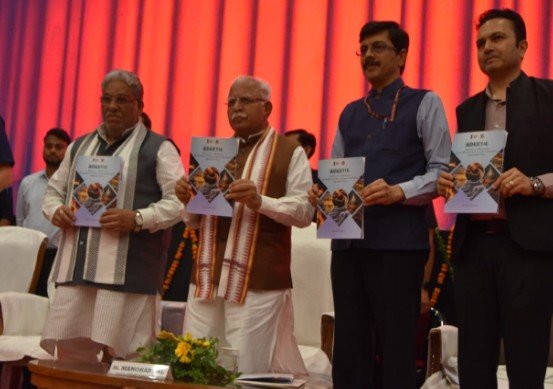In a decisive step toward India’s transition to a greener and more energy-efficient economy, the Ministry of Power today launched the Assistance in Deploying Energy Efficient Technologies in Industries & Establishments (ADEETIE) scheme. The official national roll-out was held at Arya (P.G.) College in Panipat, Haryana, and was inaugurated by the Hon’ble Union Minister of Power and Housing & Urban Affairs, Shri Manohar Lal. The scheme is poised to be a catalyst for sustainable transformation in the Micro, Small, and Medium Enterprises (MSME) sector, which forms the backbone of India’s industrial economy.
With a robust budgetary outlay of ₹1000 crore, ADEETIE is a flagship initiative designed by the Ministry of Power and implemented by the Bureau of Energy Efficiency (BEE). The scheme is structured to provide MSMEs with end-to-end financial and technical support to adopt modern energy-efficient technologies. In doing so, it seeks to reduce India’s industrial carbon footprint and help the country meet its international climate obligations.
The scheme offers a multi-pronged support mechanism for MSMEs, including a 5% interest subvention on loans for Micro and Small Enterprises and 3% for Medium Enterprises. This intervention aims to ease the financial burden of green technology upgrades for smaller industrial players and ensure that energy efficiency is not just a theoretical concept, but a financially viable and attractive proposition.
At the launch event, Minister Shri Manohar Lal also unveiled the official scheme brochure and inaugurated the dedicated online portal—adeetie.beeindia.gov.in—which will act as a single-window platform to streamline the financing process and manage application workflows for beneficiaries. In his keynote address, he emphasized the critical role of energy in driving India’s economic vision of a ‘Viksit Bharat’ (Developed India). He highlighted that energy efficiency, coupled with renewables and clean energy corridors, is pivotal for modernizing the MSME sector and making it globally competitive.
“ADEETIE is not just a scheme; it is a transformative movement. We are empowering Indian MSMEs with the right mix of technology, incentives, and financial handholding so they can lead the world in sustainable production,” the Minister remarked. He also pointed out that the adoption of the technologies under ADEETIE can result in energy savings of up to 30–50%, significantly improving the power-to-product ratio and enhancing overall industrial productivity.
Shri Pankaj Agarwal, Secretary, Ministry of Power, reiterated the strategic importance of the scheme, noting that ADEETIE targets 14 high-energy-consuming sectors and 60 industrial clusters in its initial phase. He praised BEE’s proactive role in mainstreaming energy efficiency across India’s industrial landscape and stressed the importance of a stable financing and policy framework to help MSMEs emerge as climate action leaders.
Adding a regional perspective, Shri A.K. Singh, Additional Chief Secretary (Energy), Government of Haryana, underscored the urgency of moving away from fossil fuel dependency, especially coal-based power, which still dominates industrial energy consumption. He appealed to Haryana’s MSMEs to actively participate in the scheme and take bold steps toward cleaner, more sustainable operations.
Shri Akash Tripathi, Additional Secretary and Director General of BEE, detailed the financial architecture of the ADEETIE scheme. Of the ₹1000 crore outlay, ₹875 crore has been earmarked for interest subvention, ₹50 crore for conducting Investment Grade Energy Audits (IGEA), and ₹75 crore for implementation support and Monitoring & Verification (M&V) processes. He stated that the initiative is expected to mobilize ₹9000 crore in investments, including ₹6750 crore in potential lending from participating MSMEs. This is a strategic step toward integrating India’s export-oriented industries into global sustainable value chains.
Tripathi also emphasized the value of competitiveness through energy efficiency. “As India accelerates its global manufacturing ambitions, energy must be central to our cost competitiveness and sustainability agenda,” he noted. The scheme, therefore, is not only an environmental initiative but also a productivity-enhancing strategy that could redefine industrial growth models.
The launch event was attended by key dignitaries including Shri Krishna Lal Panwar, Haryana’s Cabinet Minister for Panchayats & Development and Mines & Geology, and Smt. Priyanka Soni, Director, Department of New & Renewable Energy, Government of Haryana. The event also featured the distribution of appreciation certificates to early adopter MSMEs whose Detailed Project Reports (DPRs) were approved under the pilot phase. Memorandums of Understanding (MoUs) were signed with major industrial associations, signaling industry-wide support for the scheme.
MSME representatives shared firsthand testimonials of how energy audits and clean technology upgrades had already led to substantial operational cost savings and productivity gains, showcasing the immediate benefits of ADEETIE’s pilot phase. These early success stories added weight to the government’s claim that the scheme is practical, implementable, and effective.
The roll-out of ADEETIE is a landmark moment in India’s energy transition journey. It aligns seamlessly with national goals under the Energy Conservation Act, India’s Nationally Determined Contributions (NDCs) under the Paris Agreement, and broader international efforts to curb industrial emissions. With industrial sectors contributing significantly to India’s total energy consumption, such targeted schemes are vital for steering the country toward a low-carbon future.
As India eyes a leading role in the global green economy, ADEETIE is a bold step toward integrating sustainability into its industrial DNA—making growth and green innovation go hand in hand.
#ADEETIE #MSMEsGoGreen #EnergyEfficiencyIndia #SustainableIndustry #ViksitBharat2047 #BEEIndia #CleanEnergyMission #PanipatEvent #IndustrialInnovation #LowCarbonEconomy
This is a web generated news report.




